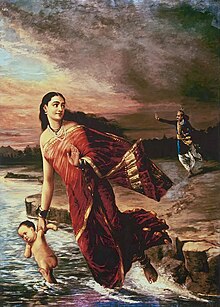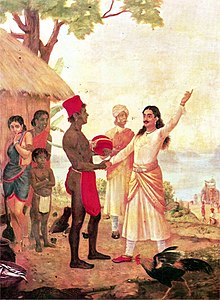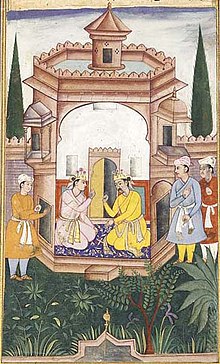In the epic Mahabharata, Bhishma (Sanskrit: भीष्म) was well known for his pledge of celibacy. The eighth son of Kuru King Shantanu and the goddess Ganga Bhishma was blessed with wish-long life and was related to both the Pandava and the Kaurava.
He was an unparalleled archer and warrior of his time. He is equal to 4
maharathi warriors, capable to defeating 4 maharathis at once. He also
handed down the Vishnu Sahasranama to Yudhishthira when he was on his death bed (of arrows) in the battle of Kurukshetra.
The legend behind Bhishma's birth is as follows — once the eight Vasus ("Ashtavasus") visited Vashishta's ashram accompanied by their wives. One of the wives took a fancy to Kamadhenu,
Vashishta's wish-bearing cow and asked her husband Prabhasa to steal it
from Vashishta. Prabhasa then stole the cow with the help of the others
who were all consequently cursed by Vashishta to be born in the world
of humans. Upon the Vasus appealing to Vashishta's mercy, the seven
Vasus who had assisted in stealing Kamadhenu had their curse mitigated
such that they would be liberated from their human birth as soon as they
were born; however, Prabhasa being protagonist of the theft, was cursed
to endure a longer life on the earth. The curse, however is softened to
the extent that he would be one of the most illustrious men of his
time. It was this Prabhasa who took birth as Bhishma.
After Devavrata was born, his mother Ganga took him to different realms, where he was brought up and trained by many eminent sages (Mahabharata Shanti Parva, section 38).
Birth
Shantanu stops Ganga from drowning their eighth child, who later was known as Bhishma.
After Devavrata was born, his mother Ganga took him to different realms, where he was brought up and trained by many eminent sages (Mahabharata Shanti Parva, section 38).
- Brihaspati: The son of Angiras and the preceptor of the Devas taught Devavrata the duties of kings (Dandaneeti), or political science and other Shastras.
- Shukracharya: The son of Bhrigu and the preceptor of the Asuras also taught Devavrata in political science and other branches of knowledge.
- Vashishtha, the Brahmarshi and Chyavana, the son of Bhrigu taught the Vedangas and other holy scriptures to Devavrata who mastered the Vedas.
- Sanatkumara: The eldest son of Lord Brahma, taught Devavrata the mental and spiritual sciences, also called the Ânvîkshîkî.
- Markandeya: The immortal son of Mrikandu of Bhrigu's race who acquired everlasting youth from Lord Shiva taught Devavrata in the duties of Brahmanas.
- Parashurama: The son of Jamadagni of Bhrigu's race. Parashurama trained Bhishma in warfare.
- Indra: It is mentioned by Vyasa that Bhishma also acquired celestial weapons from Indra as well as from other devas.
- The Holy Trinity: It is said that Brahma, Vishnu and Shiva had also taught him. Making him the wisest man as well as an unconquerable warrior.
- Bhishma means He of the terrible oath, referring to his vow of lifelong celibacy. Originally named Devavratha, he became known as Bhishma after he took the bhishama pratigya ('terrible oath') — the vow of lifelong celibacy and of service to whomever sat on the throne of his father (the throne of Hastinapur). He took this oath so that his father, Shantanu could marry a fisherwoman Satyavati — Satyavati's father had refused to give his daughter's hand to Shantanu on the grounds that his daughter's children would never be rulers. This made Shantanu despondent, and upon discovering the reason for his father's despondency,[2] Devavratha sought out the girl's father and promised him that he would never stake a claim to the throne, implying that the child born to Shantanu and Satyavati would become the ruler after Shantanu. At this, Satyavati's father retorted that even if Devavratha gave up his claim to the throne, his (Devavratha's) children would still claim the throne. Devavratha then took the vow of lifelong celibacy, thus sacrificing his 'crown-prince' title and denying himself the pleasures of conjugal love. This gave him immediate recognition among the gods. His father granted him the boon of Ichcha Mrityu (control over his own death — he could choose the time of his death, making him immortal till his chosen time of death, instead of completely immortal which would have been an even more severe curse and cause of suffering).Bhishma taking his bhishama pratigya
Criticism of King Shantanu from his subjects as to why he removed Bhishma from the title of the crown prince, as he was so capable, abounded. There was worry about the nobility of Shantanu's unborn children, now promised the throne. Hearing this, Bhishma said it was his decision and his father should not be blamed as Shantanu had never promised anything to Satyavati's father. The prime minister then asked who would be held responsible if the future crown prince isn't capable enough. Bhishma then took another vow that he would always see his father's image in whomever sat on the King's throne, and would thus serve him faithfully.[citation needed]
Years later, in the process of finding a bride for his half-brother, the young king Vichitravirya, Bhishma abducted princesses Amba, Ambika and Ambalika of Kashi (Varanasi) from the assemblage of suitors at their swayamvara. Salwa, the ruler of Saubala, and Amba (the eldest princess) were in love; Salwa attempted to stop the abduction but was soundly beaten. Upon reaching Hastinapura, Amba confided in Bhishma that she wished to wed Salwa. Bhishma then sent her back to Salwa, who, bitter from his humiliating defeat at Bhishma's hands, turned her down. Disgraced, Amba approached Bhishma for marriage. He refused her, citing his oath. Enraged beyond measure, Amba vowed to avenge herself against Bhishma even if it meant being reborn over and over again.
Amba sought refuge with Parasurama, who ordered Bhishma to marry Amba, telling Bhishma it was his duty. Bhishma politely refused saying that he was ready to give up his life at the command of his teacher but not the promise that he had made. Upon the refusal, Parasurama called him for a fight at Kurukshetra. At the battlegrounds, while Bhishma was on a chariot, Parasurama was on foot. Bhishma requested Parasurama to also take a chariot and armor so that Bhishma would not have an unfair advantage. Parasurama blessed Bhishma with the power of divine vision and asked him to look again. When Bhishma looked at his guru with the divine eyesight, he saw the Earth as Parasurama's chariot, the four Vedas as the horses, the Upanishads as the reins, Vayu (wind) as the Charioteer and the Vedic goddesses Gayatri, Savitri, and Saraswati as his armor. Bhishma got down from the chariot and sought the blessings of Parashurama to protect his dharma, along with permission to battle against his teacher. Pleased, Parashurama blessed him and advised him to protect his vow as Parasurama himself had to fight to uphold his word as given to Amba. They fought for 23 days without conclusion, each too powerful to defeat the other.Bhishma abducting princesses Amba, Ambika and Ambalika from the assemblage of suitors at their swayamvara.
In one version of the epic, on the 23rd day of battle, Bhishma attempted to use the Pashupatastra against Parashurama. Learned in his previous birth as Prabhasa (one of Ashta Vasus), this weapon was not known to Parasurama and would put the afflicted to sleep in the battlefield. This would have given Bhishma the victory. Before he could release it, however, a voice from the sky warned him that "if he uses this weapon it would be a great insult towards his Guru." Pitrs then appeared and obstructed the chariot of Parashurama, forbidding him from fighting any longer. At the behest of the divine sage Narada and the gods, Parashurama ended the conflict and the battle was declared a draw by Gods.
Parashurama narrated the events to Amba and told her to seek Bhishma's protection. However, Amba refused to listen to Parashurama's advice and left angrily declaring that she would achieve her objective by asceticism. Her predicament unchanged, did severe penance to please Lord Shiva. Lord Shiva assured her that she would be born as a man named (Shikhandi) in her next birth (and still she would recall her past) and could be instrumental in Bhishma's death, thus satisfying her vow.
In The Kurukshetra War
In the great battle at Kurukshetra, Bhishma was the supreme commander of the Kaurava forces for ten days. He fought reluctantly on the side of the Kauravas. Bhishma was one of the most powerful warriors of his time and in history. He acquired his prowess and invincibility from being the son of the sacred Ganga and by being a student of renowned Gurus. Despite being about five generations old, Bhishma was too powerful to be defeated by any warrior alive at that time. Every day, he slew at least 10,000 soldiers and about a 1,000 rathas. At the beginning of the war, Bhishma vowed not to kill any of the Pandavas, as he loved them, being their grand-uncle. Duryodhana often confronted Bhishma alleging that he was not actually fighting for the Kaurava camp as he wouldn't kill any of the pandavas. He also did not allow any of the Kauravas to be killed in the war, as he loved all his grand-nephews and wanted a peace negotiation.Arjuna fight Bhishma
Duryodhana approached Bhishma one night and accused him of not fighting the battle to his full strength because of his affection for the Pandavas. The angry Bhishma took a vow that either he will kill Arjuna or will make Lord Krishna break his promise of not picking up any weapons during the war. On the next day there was an intense battle between Bhishma and Arjuna. Although Arjuna was very powerful, he was no match for Bhishma. Bhishma soon shot arrows which cut Arjuna's armour and then also his Gandiva bow's string. Arjuna was helpless before the wrath of his grand-uncle. As Bhishma was about to kill Arjuna with his arrows, Sri Krishna who took vow of not raising a weapon in the war, lifted a chariot wheel and threatened Bhishma. Arjuna stopped Lord Krishna. Arjuna convinced Krishna to return to the chariot and put down the wheel, promising to redouble his determination in the fight. Thus Bhishma fulfilled his vow.
The war was thus locked in a stalemate. As the Pandavas mulled over this situation, Krishna advised them to visit Bhishma himself and request him to suggest a way out of this stalemate. Bhishma loved the Pandavas and knew that he stood as the greatest obstacle in their path to victory and so when they visited Bhishma, he gave them a hint as to how they could defeat him. He told them that if faced by one who had once been of the opposite gender, he would lay down his arms and fight no longer.
Later Krishna told Arjuna how he could bring down Bhishma, through the help of Sikhandhi. The Pandavas were initially not agreeable to such a ploy, as by using such cheap tactics they would not be following the path of Dharma, but Krishna suggested a clever alternative. And thus, on the next day, the tenth day of battle Shikhandi accompanied Arjuna on the latter's chariot and they faced Bhishma who put his bow and arrows down. He was then felled in battle by Arjuna, pierced by innumerable arrows. Using Sikhandhi as a shield, Arjuna shot arrows at Bhishma, piercing his entire body. Thus, as was preordained (Mahadeva's boon to Amba that she would be the cause of Bhishma's death) Shikhandi, that is, Amba reincarnated was the cause of Bhishma's fall. As Bhishma fell, his whole body was held above the ground by the shafts of Arjuna's arrows which protruded from his back, and through his arms and legs. Seeing Bhishma lying on such a bed of arrows humbled even the gods who watched from the heavens in reverence. They silently blessed the mighty warrior. When the young princes of both armies gathered around him, inquiring if there was anything they could do, he told them that while his body lay on the bed of arrows above the ground, his head hung unsupported. Hearing this, many of the princes, both Kaurava and the Pandava alike brought him pillows of silk and velvet, but he refused them. He asked Arjuna to give him a pillow fit for a warrior. Arjuna then removed three arrows from his quiver and placed them underneath Bhishma's head, the pointed arrow tips facing upwards. To quench the war veteran's thirst, Arjuna shot an arrow into the earth, and a jet stream of water rose up and into Bhishma's mouth. It is said that Ganga herself rose to quench her son's thirst.
Death
After the war, while on his deathbed (arrow bed) he gave deep and meaningful instructions to Yudhishthira on statesmanship and the duties of a king. Bhishma always gave priority to Dharma. He always walked in path of Dharma, even though his circumstances because of his promise, he was supposed to forcefully follow the orders of his king Dhritharashtra, which were mostly Adharma, he was totally upset. In between the Kurukshetra War Lord Krishna advised Bhishma that, when duties are to be followed you have to follow them without looking for the promises, if those promises are making path for sadness to the society it has to be broken at that point itself and should be given priority to the moral duty only. Finally Bhishma gave up the fight, focusing his life force and breath, sealing the wounds, and waiting for the auspicious moment to give up his body on the arrow bed. He did wait for about 58 nights for the winter solstice or first day of Uttarayana to give up his body on the arrow bed. Mahabharata states that he attained salvation after his death. He was granted the Maatru Lok (which is considered even above vaikunth dhaam). Magha (month) Shukla Ashtami marks the death anniversary of Bhishma Pitamah(Father), the day being known as Bhishma Ashtami. Hindus observe Ekodishta Śrāddha for him on this day, since many generations, and can only be performed by those whose fathers are not alive. Bhishma Panchaka vrata(fast) is observed in all Vishnu temples, starting from Bhishma Ashtami, for five days till Bhishma Dwadasi.[6] People believe that they will be blessed with a son, having the steadfast qualities of Bhishma if they observe these holy rituals on the river bank.The death of Bhishma
Personality, Legacy and Skills
Bhishma is often considered as a great example of devotion and sacrifice. His name itself is an honour to him - Bhishma which means severe because he took a severe vow to remain celibate for life and Pitamah which means Grandfather. Bhishma was one of the greatest Bramhacharis of all time. Accumulation of Ojas due to his Bramhacharyam made him the strongest warrior of the era. He had stature and personality that in those times were fit for kings. He was a true Kshatriya as well as a disciplined ascetic - a rare combination. Like a true Kshatriya, he never unnecessarily exhibited passion and anger. A symbol of truth and duty, the benevolent Bhishma was in all senses a true human. It is unfortunate that a person as noble as Bhishma saw a life full of loneliness, frustration and sadness. But that was how Vashishta's curse was supposed to unfold. Bhishma's human birth was destined to be marked with suffering, and that was how his life transpired right till the last moment; even his death was very painful. But the strong as steel character which he possessed ensured that he never shied away from his duty, and never stopped loving those dear to him.Yudhishthira with Bhishma, from the Razm-namah, by Fattu, 1598
Despite being an erudite scholar, a disciplined ascetic and a powerful warrior, Bhishma wasn't without his flaws. He rashly kidnapped the three princesses of Kashi against their will, on behalf of his half brother. Bhishma failed to correct Duryodhana from his wicked ways, and he also failed to save Draupadi from being disrobed in public.
Bhishma was an invincible warrior. He was also a highly skilled in political science. He had all the qualities and abilities for an excellent king. His goodness and sacrifice made him one of the greatest devotees of Lord Krishna himself. He tried his best to bring reconciliation between the Pandavas and Kauravas to prevent the war. Even in the Kurukshetra war, while he was the general, he tried his best to keep the war low key by minimizing confrontation between the two camps. Even as he fell he tried to use the opportunity to persuade both camps to put an end to the war. Bhishma was a complete human, a complete warrior and a complete teacher (acharya), hence he was known as Bhishmacharya.
SOURCES : WIKIPEDIA ,MAHABHARTA,BESHAM PITAMAH ,18 DAYS NOVAE
POSTED BY : VIPUL KOUL
EDITED BY: ASHIK KOUL








No comments:
Post a Comment